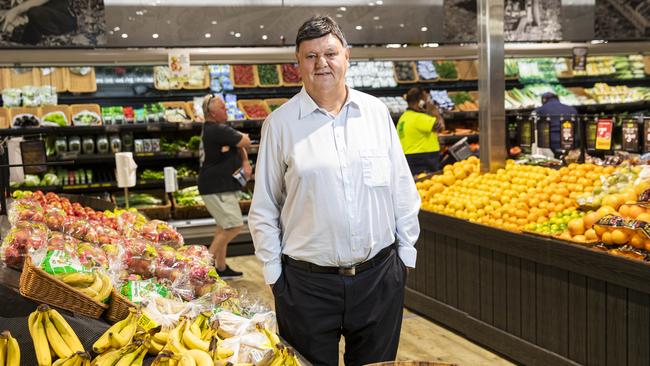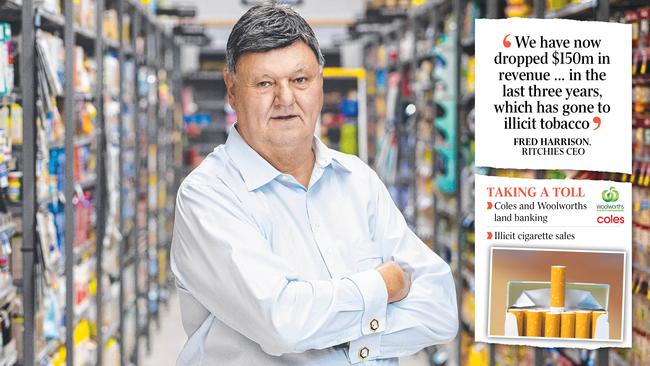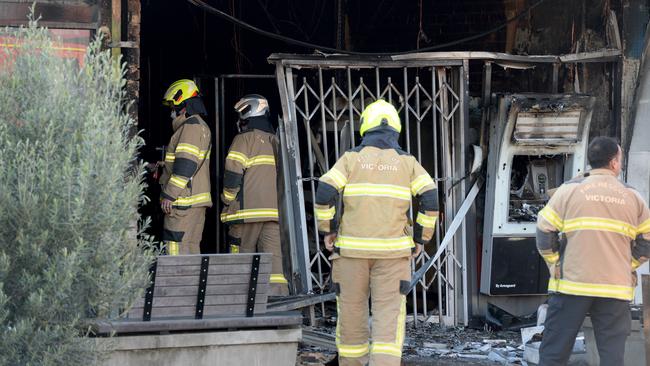Supermarket chain Ritchies wants the illicit tobacco trade plus land banking by big rivals to end
The proliferation of the illegal tobacco trade and the dominant power of Woolworths and Coles are weighing on Fred Harrison’s independent supermarket chain, Ritchies.

Fred Harrison is feeling the shockwaves from two of the most threatening and costly forces now crashing into the nation’s independent supermarkets; the proliferation of the illegal tobacco trade and the dominant power of Woolworths and Coles.
The first headache, smokers’ willingness to buy cheap, illegal tobacco from dodgy and dingy suburban cigarette shops, is costing his Ritchies stores $50m a year in lost sales, he says.
The second threat, he alleges, is the ability for Woolworths and Coles to buy up land for new stores and then sit on it – known in the industry as “land banking”. The duo are also getting the choice new sites offered by shopping centre landlords, with both strategies keeping independent supermarkets such as Ritchies locked out of some suburbs.

His solution to these twin problems is action from government and regulators. In the first case, for governments and police to properly enforce the laws around the sale of illegal tobacco and shut down the obvious stores trading in plain sight in this vice. As for the creeping power of Woolworths and Coles, Mr Harrison wants land banking outlawed and a competitive test applied by the Australian Competition & Consumer Commission any time the two major chains want to open a new store in a suburb.
There is also the rampant inflationary pressures inside the Ritchies business that is hurting – pushing up costs by more than $15m in 2024 as wages, electricity, utilities, rents and taxes eat away at profits, according to its latest accounts. But for now Mr Harrison, CEO of the nation’s largest network of independent supermarkets, will settle for action on illegal tobacco, and reining in the power of Woolworths and Coles.
“The biggest issue is tobacco. We have now dropped around $150m in revenue, or more than 10 per cent of our annual sales, in the last three years, which has gone to illicit tobacco,” Mr Harrison told The Australian.
It is not only the loss of the legal tobacco that his Ritchies stores sells that is pinching the company’s bottom line, as there is also the loss of a shopping basket of goods bought by smokers when they come into the store. “It is hurting us,” Mr Harrison said.

“Not only have we lost to the illicit tobacco sales, but 31 per cent of customers who were purchasing tobacco from us are no longer, and we have dropped a further $24.90 per shopper in groceries or liquor that they also bought, as they would buy tobacco and then spend another $24.90 in the store, like milk, or breakfast food or lunch.
“Illicit tobacco has really impacted our sales and footfall.”
Ritchies has 78 stores through Victoria, NSW and Queensland. According to latest accounts lodged with the Australian Securities & Investments Commission, the retailer booked a slight rise in sales for 2024 to $1.36bn, from $1.33bn in 2023.
“Now, while I’m not advocating smoking. It is a legal product, as is Coca-Cola with sugar. If it is legal we will sell it,” Mr Harrison said. “But we have been very disappointed, and I am meeting with the illicit tobacco commissioner in Canberra on Monday to present the case why we need the government to be far more proactive in addressing the issues, because we are seeing customers now buying more and more illicit tobacco and there are no consequences.
“A lot of the bikie gangs have moved into tobacco because there are no consequences. If you get caught with selling drugs you go to jail for years and years but if you get caught selling illicit tobacco it’s a slap on the wrist and a couple of thousands dollars of fines, so who cares?”
Amid the regulatory crackdown on the major supermarket chains and the ACCC court case against Woolworths and Coles alleging the pair used fake or illusory discounts to lure shoppers, Mr Harrison is seeking greater protections for independent retailers.
Independents such as Ritchies are constantly having to fend off the majors grabbing land, sitting on it (which blocks other retailers from using it) and saturating suburbs with stores to crowd out others.
A Senate inquiry into supermarkets earlier this year looked at land banking, which Woolworths and Coles have denied is a deliberate strategy but argued that it can take time to buy, develop and then open a new store once land is secured.
Land banking needed to be outlawed “because Coles and Woolworths are holding the sites and almost preventing or making it extremely difficult for other retailers to go in,” Mr Harrison said.
“I would also like to think that there is going to be (a new law) that before Coles and Woolworths either acquire a store or open a greenfield site that there is a competition test done in that marketplace to see whether that marketplace deserves or warrants another Coles or Woolworths.”
Under Mr Harrison’s plan landlords then would have to talk to Aldi, IGA or another independent to take that space.
Some of these issues could be explored by the ACCC inquiry into the supermarkets, which resumes its public hearings this week.




To join the conversation, please log in. Don't have an account? Register
Join the conversation, you are commenting as Logout